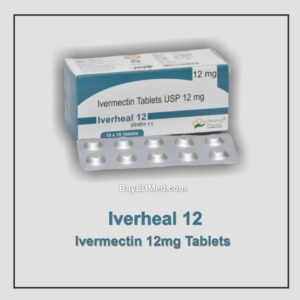$230.00 – $675.00Price range: $230.00 through $675.00
Brand name – Primovir
Generic name – Nirmatrelvir 150mg & Ritonavir 100mg
Indications – Anti-viral Medication
Manufacturer – Astrica Healthcare
Packaging – Combo Pack of 30 tablets
PRIMOVIR has not been approved, but has been authorized for emergency use by FDA under an EUA, for the treatment of mild-to-moderate COVID-19 in adults and pediatric patients (12 years of age and older weighing at least 40 kg) with positive results of direct SARS-CoV-2 viral testing, and who are at high risk for progression to severe COVID-19, including hospitalization or death.
The emergency use of PRIMOVIR is only authorized for the duration of the declaration that circumstances exist justifying the authorization of the emergency use of drugs and biological products during the COVID-19 pandemic under Section 564(b)(1) of the Act, 21 U.S.C. § 360bbb-3(b)(1), unless the declaration is terminated or authorization revoked sooner.
COVID-19 is caused by a virus called coronavirus. You can get COVID-19 through close contact with another person who has the virus.
COVID-19 illnesses have ranged from very mild to severe, including illness resulting in death. While information so far suggests that most COVID-19 illness is mild, serious illness can happen and may cause some of your other medical conditions to become worse.
Older people and people of all ages with severe, long-lasting (chronic) medical conditions like heart disease, lung disease, and diabetes, for example, seem to be at higher risk of being hospitalized for COVID-19.
PRIMOVIR is an investigational medicine used to treat mild-to-moderate COVID-19 in adults and children [12 years of age and older weighing at least 88 pounds (40 kg)] with positive results of direct SARS-CoV-2 viral testing, and who are at high risk for progression to severe COVID-19, including hospitalization or death.
PRIMOVIR is investigational because it is still being studied. There is limited information about the safety and effectiveness of using PRIMOVIR to treat people with mild-to-moderate COVID-19.
The FDA has authorized the emergency use of PRIMOVIR for the treatment of mild-to-moderate COVID-19 in adults and children [12 years of age and older weighing at least 88 pounds (40 kg)] with a positive test for the virus that causes COVID-19, and who are at high risk for progression to severe COVID-19, including hospitalization or death, under an EUA.
If you test positive for COVID‑19, talk to your healthcare provider as soon as possible. Your healthcare provider can tell you about your treatment options and if PRIMOVIR is appropriate for you.
People of all ages or groups can be infected with COVID-19. Some people are more likely than others to get very sick from COVID-19, which can lead to hospitalization or death, even when symptoms start off as mild.
Some people are at a greater risk of COVID-19 becoming severe because they meet certain criteria, including where they live, work, or have difficulty accessing health care. This includes many people from racial and ethnic minority groups and people with disabilities.
In addition, having one or more of the following factors puts you at high risk of getting severe COVID-19 :
| Packing Size | 1 Kit, 2 Kit, 3 Kit |
|---|



